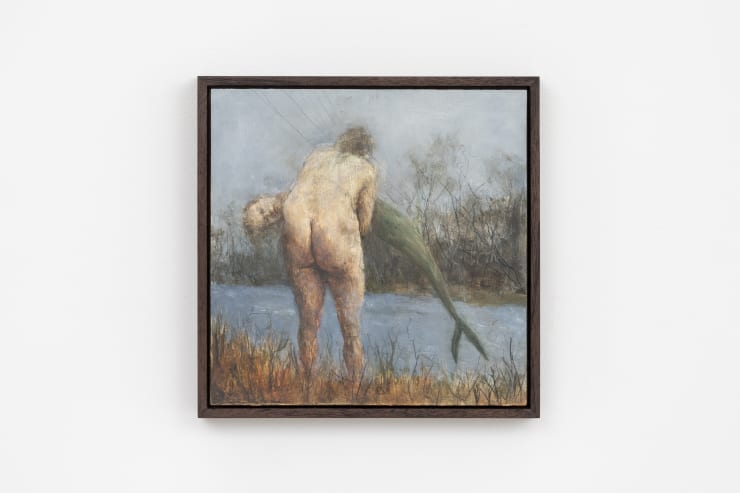Casey Bolding, Marie Rud Rosenzweig, Sophie Schmidt, Raya Terran, Randy Wray: The Colour of Pomegranates
Casey Bolding, Marie Rosenzweig, Sophie Schmidt, Raya Terran and Randy Wray
The Colour of Pomegranates
2 June–22 July 2023
MAMOTH is thrilled to announce a new group show titled The Colour of Pomegranates, which includes works by Casey Bolding, Marie Rosenzweig, Sophie Schmidt, Raya Terran and Randy Wray.
The Colour of Pomegranates features five artists whose paintings portray interiority. In their works, Casey Bolding, Marie Rud Rosenzweig, Sophie Schmidt, Raya Terran and Randy Wray employ abstraction and surrealism as tools to allude to the realm of mental images, memories, emotions, sensations and daydreams. Coloured in soft neutrals or hallucinatory tones, the ambiguous scenes and images of their paintings are anchored in the familiar yet incessantly pulling away from it, neither fully real nor entirely fantasy.
The exhibition takes its title from a 1969 Armenian film that captures the life of a famous musician through symbolism and poetry rather than biographical fact. Similarly, the five exhibited artists depict less the veracity of life – its events, dates and hard-edged contours – than the volatile emotions and sensations that can crystallise into memories or a different sense of self. The artists avoid or deliberately resist clearly defined boundaries and explicit interpretation. Moving seamlessly through material, corporeal and psychological spaces, they seek instead to articulate the entanglement of our interior landscapes with the exterior world.
Several works in The Colour of Pomegranates return to the porosity and potential mutability of the body. In her series ‘Schneehühnfrau’, the multidisciplinary artist Sophie Schmidt (b. 1986) uses rich flurries of pastel strokes to depict a hybrid being that is part-woman, part-bird. Though the wings of this being are outstretched, her body is split following a central axis to reveal teeth, eggs and orifices hidden between the feathers. The openness of the Schneehühnfrau’s body, however, is less reflective of vulnerability than a ravenous desire for connection. The works themselves were made in a spirit of receptivity. In Schmidt’s practice, a performance might lead to a painting or a painting to a performance. The ‘Schneehühnfrau’ were painted following a private performance in which the artist exposed her naked body to the snow outside her studio. The backgrounds of the works were then painted in aquarelle and rubbed with the same snow.
Raya Terran (b. 1996) is interested in how bodies change while moving through space. In soft, delicate tones inspired by the browns, blues and greens she sees in the world, Terran paints naked figures in an imagined landscape of highways, prairies and malls that recall the United States. Neither human nor chimerical, these lively figures interact in mysterious ways, their gestures between love and hate, their movement through the land either a running towards or a fugue. Through her paintings, Terran captures individuals in a process of change, adapting to surrounding environments while breaking away from selfhoods they assumed or were expected to assume.
Randy Wray’s (b.1965) amoebic works gesture to the beginning of abstract painting, when previously invisible forces became visible through technologies such as scans, X-rays or infrared light. Working without solvents, the artist spreads, rubs and cakes oil onto canvas before scraping it off or sanding it down to create areas with the smoothness of skin or the coarseness of bark. In the eye of the viewer, Wray’s boldly coloured and fluid forms rearrange themselves into a bone joint, then a tree ring, then a polyp, then a brain. The cells merge and divide, always in the midst of a transformation, suggesting a continuum between the realms of the human, the natural and the fictional.
A return home sparked Casey Bolding’s (b. 1987) recent series of suspended narratives. He likens his process to catching a few words from a conversation, then composing a world around them. He depicts narratives already unfolding, with their endings still unclear. Figures with obscured faces stand silently across from one another while trees and barbed wire slice through the composition. The interactions appear placid, yet the paintings feel full of friction, as Bolding seeks to capture the way memories can cloud or splinter our experience of the present.
Marie Rud Rosenzweig (b. 1991) uses the canvas to create a psychological space which familiar objects and images seem to float through, as though projected on a movie screen. For Rosenzweig, the act of painting is cousin to the act of fantasising. When she paints objects she finds on the street or at the flea market, she daydreams about the life that surrounded the object. Her series of circle paintings refer to the intro and outro scene of the Looney Tunes cartoons, and are meant to embody an in-between space where anything can happen. While each of Rosenzweig’s works begins with images from the real world, the act of painting becomes a means to explore the psychological weight we assign to objects and images from popular culture.
Text by Edmée Lepercq








